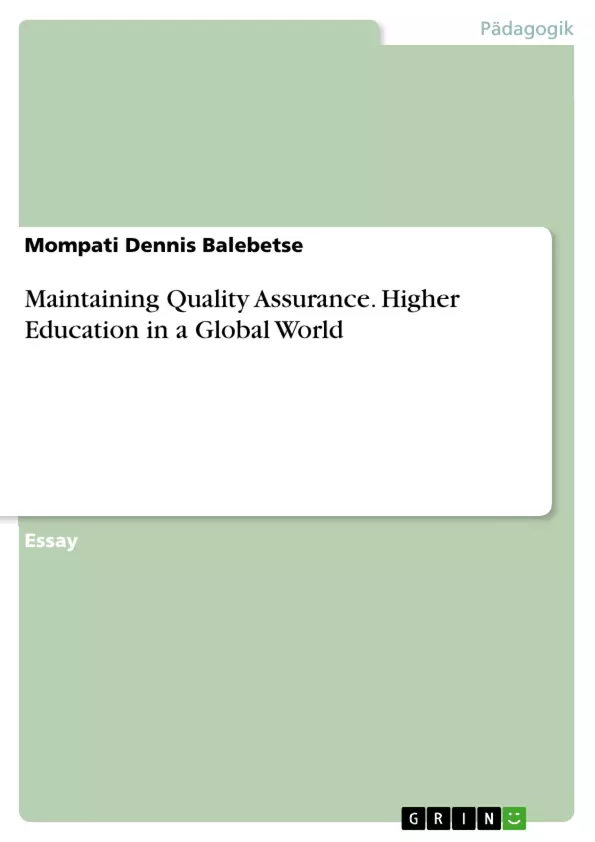This essay is about the quality assurance in education. There are two questions. The first one is about the Planning is a key aspect of an institution’s approach to quality and this one is often thought of as the initial aspect of quality cycle. Planning does tend to have an important position within institutions however, perhaps because Governing Council/ Board expect to see a plan for future activity and details of where the institution is hoping to go, as a complement to approval of the budget.
The second one is about the fact that previous studies have found out that the performance measurement systems are very important in the context of higher education institutions. Here, to measure the performance and quality, Al-Zwyalif, pointed out that the universities should execute the Balance Scorecard in order to manage and evaluate the overall performance as well as to ensure quality.
Inhaltsverzeichnis
- QUESTION 1
- Q1a. Planning is a key aspect of an institution's approach to quality
- Q1b. According to Module 3 of Maintaining quality assurance within institution (2015), in the past, many higher education providers
- QUESTION 2
- Q2a. Previous studies have found out that the performance measurement systems are very important in the context of higher education institutions (HEIs).
Zielsetzung und Themenschwerpunkte
Dieser Text befasst sich mit der Bedeutung von Qualitätsmanagement in Hochschulinstitutionen. Er analysiert die verschiedenen Phasen des Qualitätszyklus, von der Planung bis zur Verbesserung, und beleuchtet die Rolle von Evaluierungsmethoden und -systemen im Kontext der Qualitätssicherung.
- Phasen des Qualitätszyklus in Hochschulinstitutionen
- Bewertung von Qualität und Leistung in Hochschulinstitutionen
- Balanced Scorecard als Instrument zur Leistungsbewertung
- Rolle von Richtlinien und Verfahren in der Qualitätssicherung
- Bedeutung der Berücksichtigung verschiedener Perspektiven bei der Qualitätsmessung
Zusammenfassung der Kapitel
QUESTION 1
Q1a. Planning is a key aspect of an institution's approach to quality
Der Text betont die Bedeutung von Planung im Rahmen des Qualitätsmanagements in Hochschulinstitutionen. Die Planung umfasst die Festlegung von Terminen für Gremien und Ausschüsse, die Organisation von Lehrbeobachtungen und die Sicherstellung der internen Überprüfung von Assessments.
Q1b. According to Module 3 of Maintaining quality assurance within institution (2015), in the past, many higher education providers
Der Text erläutert die moderne Politik der Qualitätsprüfung in Hochschulen. Er beschreibt die Elemente einer Review-Politik, einschließlich ihres Zwecks, des Geltungsbereichs, der Verantwortlichkeiten und der Genehmigungs- und Bestätigungsprozesse.
QUESTION 2
Q2a. Previous studies have found out that the performance measurement systems are very important in the context of higher education institutions (HEIs).
Der Text beleuchtet die Bedeutung von Performance-Messsystemen in Hochschulinstitutionen und stellt die Balanced Scorecard (BSC) als ein weit verbreitetes Instrument zur Messung und Bewertung der Gesamtleistung vor. Die BSC umfasst vier Perspektiven: die finanzielle Perspektive, die Kundenperspektive, die interne Prozessperspektive und die Lern- und Wachstumsperspektive.
Schlüsselwörter
Qualitätsmanagement, Hochschulinstitutionen, Qualitätszyklus, Planung, Bewertung, Performance-Messsysteme, Balanced Scorecard, Richtlinien, Verfahren, Perspektiven, Qualitätssicherung, Leistungsbewertung.
Häufig gestellte Fragen
Welche Bedeutung hat die Planung für das Qualitätsmanagement an Hochschulen?
Die Planung ist der erste Schritt im Qualitätszyklus und stellt sicher, dass Ziele, Budgets und Verantwortlichkeiten für die Sicherung der Lehrqualität klar definiert sind.
Was ist die Balanced Scorecard (BSC) im Hochschulkontext?
Die BSC ist ein Instrument zur Leistungsmessung, das vier Perspektiven (Finanzen, Kunden/Studierende, interne Prozesse, Lernen/Wachstum) einbezieht, um die Gesamtqualität der Universität zu steuern.
Warum ist eine regelmäßige Evaluierung der Lehre notwendig?
Regelmäßige Reviews und Lehrbeobachtungen helfen dabei, Schwachstellen zu identifizieren und die Einhaltung akademischer Standards dauerhaft zu gewährleisten.
Was gehört zu einer modernen Review-Politik an Hochschulen?
Dazu zählen klare Richtlinien zum Geltungsbereich, definierte Verantwortlichkeiten der Gremien und transparente Prozesse zur Genehmigung von Assessments.
Welchen Zweck erfüllt das Qualitätsmanagement in einer globalisierten Welt?
Es sichert die internationale Vergleichbarkeit von Abschlüssen und erhöht die Attraktivität der Institution für Studierende und Forscher weltweit.
- Citation du texte
- Mompati Dennis Balebetse (Auteur), 2021, Maintaining Quality Assurance. Higher Education in a Global World, Munich, GRIN Verlag, https://www.grin.com/document/1022909



